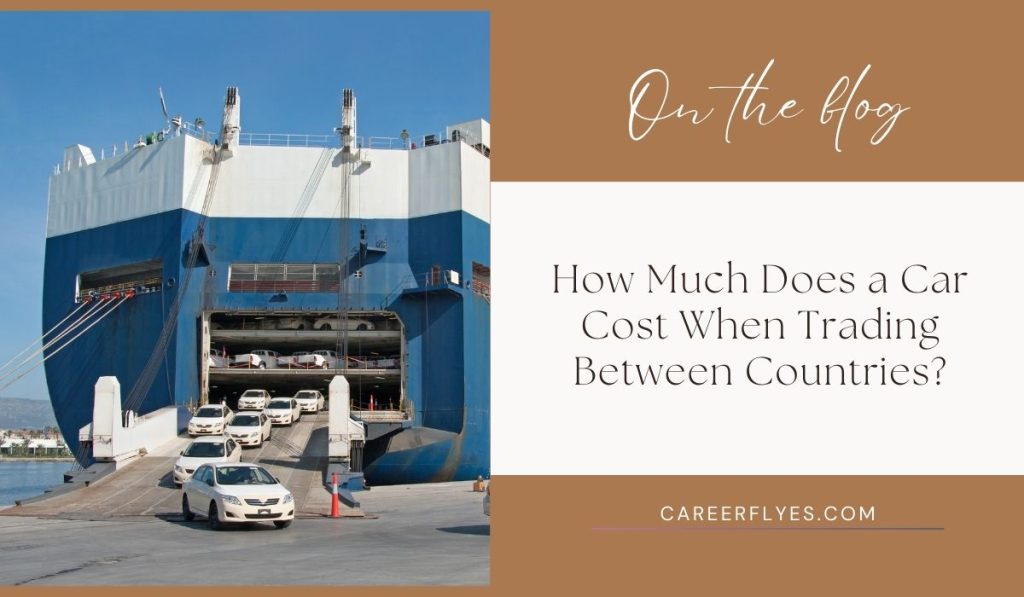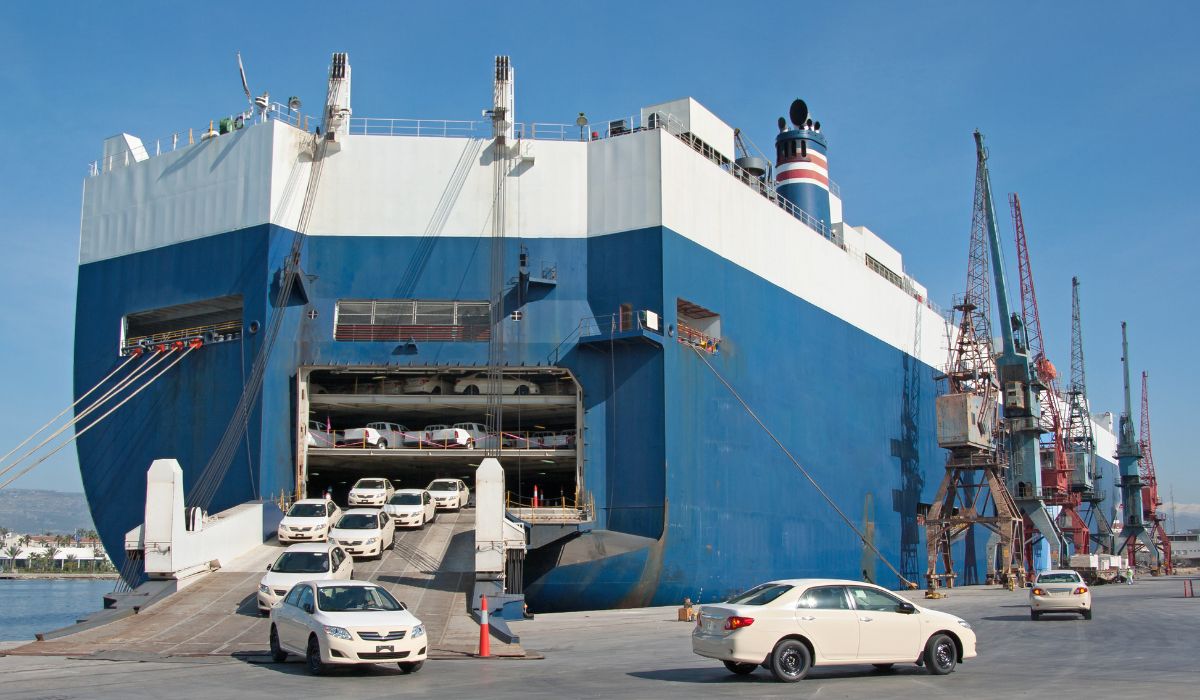How Much Does a Car Cost When Trading Between Countries?
6 min read
Importing or exporting a car from another country can be exciting, whether it’s to access unique models, special features, or competitive pricing. However, it’s important to understand the full costs involved in moving a car across international borders. This guide walks you through all the expenses involved in international car trading—from shipping fees to compliance costs—helping you decide if it’s worth the investment.
Factors Affecting the Cost of Importing or Exporting a Car

The total cost of trading a car between countries depends on several factors. Here are some key ones to consider:
- Shipping Costs: Shipping often represents a significant portion of the total cost when trading a car internationally. The distance between countries, shipping method (container vs. roll-on/roll-off), and origin and destination all impact the price.
- Import Duties and Taxes: Each country has its own set of taxes and import duties. Depending on the destination, import duties can range from 10% to 25% of the car’s value, and VAT or other consumption taxes may apply, typically ranging from 5% to 20%.
- Car Value and Condition: The car’s market value, age, and condition impact its resale value and the import duties you’ll need to pay. Luxury, high-performance, or rare cars often incur higher import duties or additional luxury taxes in some countries.
- Insurance Costs: Insurance is essential to protect against potential damages during shipping, adding another layer of cost but providing valuable protection.
- Compliance with Local Regulations: Each country has unique safety, emission, and vehicle standards. Cars may require modifications—such as changes to headlights, emissions systems, or electronic safety features—to meet these regulations, which can significantly increase the total cost.
Key Expenses in International Car Trading

Let’s break down the major expenses you can expect when trading a car between countries.
Shipping and Freight Charges
Shipping costs vary widely depending on the distance and shipping method:
- Roll-on/Roll-off (RoRo): This method allows the car to be driven onto a ship and is typically more affordable, costing between $1,000 and $3,000.
- Container Shipping: With this method, the car is placed in a container, offering more protection but at a higher cost, generally between $3,000 and $5,000.
Cost-Saving Tip: To save on shipping, consider consolidating your shipment with other vehicles or opting for RoRo shipping if available.
Customs Duties and Import Taxes
Customs duties and import taxes are often a significant part of the overall cost. Here’s what to expect:
- Import Duties: These range from 10% to 25% of the car’s declared value, depending on the destination country and vehicle type.
- VAT and Other Taxes: In addition to import duties, many countries charge VAT or similar consumption taxes on imported goods, typically ranging from 5% to 20%.
Example: If you’re importing a $20,000 car to a country with a 15% import duty and 10% VAT, you’d pay an additional $5,000 in taxes.
Modification and Compliance Costs
To meet local regulations, some cars need modifications, which can vary widely in cost:
- Safety and Emission Standards: Modifications to meet safety or emission standards may cost anywhere from a few hundred to several thousand dollars, depending on the country and the car. European countries, for example, often require compliance with the latest Euro emission standards, which may necessitate costly upgrades.
- Certification and Testing Fees: In some countries, imported cars must undergo testing to ensure they meet local standards. These fees typically range from $100 to $500. For those seeking quality chassis suspension in Melbourne, expert solutions are available to ensure vehicles meet local requirements while enhancing performance and durability.
Port Fees and Storage Costs
After your car arrives at the port, it may incur additional fees:
- Port Fees: These fees cover handling and documentation at the port and range from $100 to $500.
- Storage Fees: Delays in customs processing or documentation issues may require your car to be stored at the port, incurring extra daily costs.
Other Fees and Miscellaneous Costs
Additional costs may include:
- Documentation Fees: Charges for customs documentation, generally between $50 and $200.
- Broker Fees: If you use a customs broker to handle the import process, expect to pay an additional fee, typically $200–$500.
- Currency Exchange Rates: If paying in a different currency, factor in the exchange rate, as fluctuations can impact your total cost.
Step-by-Step Process for Importing or Exporting a Car

If you decide to trade a car internationally, here’s a step-by-step guide to help you through the process.
Step 1: Research Import Rules and Restrictions
Each country has unique import rules and may restrict certain types of cars. Check the destination’s import regulations for safety, emissions, and restrictions on left-hand or right-hand drive vehicles. Some countries also ban older cars or impose higher taxes on them.
Step 2: Calculate Total Estimated Cost
Once you understand the rules, calculate the full cost of the transaction. Include shipping, import duties, taxes, modification expenses, and port fees. Having a realistic budget will help you avoid unexpected expenses.
Step 3: Arrange for Shipping and Insurance
Select a reputable shipping company and get insurance coverage for your car. Insurance protects you from potential losses if your car is damaged during transit, so choose a policy that provides adequate coverage.
Step 4: Pay Import Taxes and Duties
When the car arrives, you’ll need to declare its value and pay the necessary import taxes and duties. Keep all purchase and shipping documents ready for customs to calculate the import charges accurately.
Step 5: Handle Customs Clearance and Registration
After paying all duties, you can begin the customs clearance process. Once cleared, register your car in the new country to get a local license plate and complete any final paperwork.
Tips for Reducing Costs When Trading Cars Internationally
There are ways to reduce costs and make the process more affordable:
- Compare Shipping Companies: Getting multiple quotes allows you to choose the most cost-effective shipping company.
- Use Roll-On/Roll-Off Shipping: If your destination country offers it, RoRo is typically cheaper than container shipping.
- Explore Exemptions and Incentives: Some countries offer duty-free import options or incentives for eco-friendly vehicles (e.g., electric or hybrid cars) or for residents returning from extended time abroad. Additionally, some countries have tax rebates or lower import duties for vehicles under a certain age or emission standard.
- Avoid Unnecessary Modifications: Check if modifications are required so you don’t spend money on upgrades that aren’t necessary for compliance.
Cost-Saving Tip: Research duty-free import programs or incentives for environmentally friendly cars, as they may lower your tax burden.
Frequently Asked Questions (FAQs)
What Are the Cheapest Countries to Import a Car From?
Countries like Japan and South Korea often have lower vehicle prices and affordable shipping, making them popular sources for imported cars.
Is It Worth Trading Cars Across Borders for Personal Use?
It can be worth it if you’re buying a rare or specific model that’s unavailable locally. However, the total costs should be carefully calculated to ensure it’s financially viable.
Can I Import a Used Car to Another Country?
Yes, but some countries restrict the import of older cars or require additional compliance testing for used vehicles.
How Long Does the International Car Trade Process Take?
The process timeline depends on factors like the shipping method (RoRo or container), customs efficiency, and modification needs. It can take from a few weeks (for nearby countries) to several months (for distant regions or high-demand ports). Shipping alone often takes 2-6 weeks, with customs adding further delays in some cases.
Conclusion
Trading a car internationally comes with several costs, including shipping fees, taxes, and potential compliance expenses. By understanding these costs and following a step-by-step process, you can make informed decisions and avoid surprises. International car trading can be rewarding, especially if you’re seeking a specific model, but it requires careful budgeting and planning.
Have questions about trading cars internationally? Share your experiences or ask questions in the comments below! If you found this guide helpful, consider sharing it with others interested in cross-border car trading.


